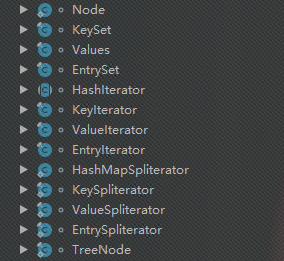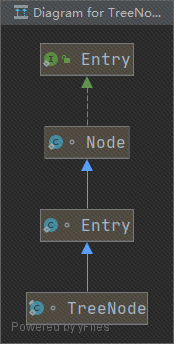总览

继承关系

内部类
静态内部类签名
// 封装一个节点
static class Node<K,V> implements Map.Entry<K,V> {}
// hashMap 分割遍历器
static class HashMapSpliterator<K,V> {}
static final class KeySpliterator<K,V>
extends HashMapSpliterator<K,V>
implements Spliterator<K> {}
static final class ValueSpliterator<K,V>
extends HashMapSpliterator<K,V>
implements Spliterator<V> {}
static final class EntrySpliterator<K,V>
extends HashMapSpliterator<K,V>
implements Spliterator<Map.Entry<K,V>> {}
// 树节点,他们共同
static final class TreeNode<K,V> extends LinkedHashMap.Entry<K,V> {}
成员内部类签名
// 存储 Key 值的集合
final class KeySet extends AbstractSet<K> {}
// 存储 values 值的集合
final class Values extends AbstractCollection<V> {}
final class EntrySet extends AbstractSet<Map.Entry<K,V>> {}
abstract class HashIterator {}
final class KeyIterator extends HashIterator
implements Iterator<K> {}
final class ValueIterator extends HashIterator
implements Iterator<V> {}
final class EntryIterator extends HashIterator
implements Iterator<Map.Entry<K,V>> {}
具体类
Node
static class Node<K,V> implements Map.Entry<K,V> {
final int hash;
final K key;
V value;
Node<K,V> next;
Node(int hash, K key, V value, Node<K,V> next) {
this.hash = hash;
this.key = key;
this.value = value;
this.next = next;
}
public final K getKey() { return key; }
public final V getValue() { return value; }
public final String toString() { return key + "=" + value; }
public final int hashCode() {
return Objects.hashCode(key) ^ Objects.hashCode(value);
}
public final V setValue(V newValue) {
V oldValue = value;
value = newValue;
return oldValue;
}
public final boolean equals(Object o) {
if (o == this)
return true;
if (o instanceof Map.Entry) {
Map.Entry<?,?> e = (Map.Entry<?,?>)o;
if (Objects.equals(key, e.getKey()) &&
Objects.equals(value, e.getValue()))
return true;
}
return false;
}
}
KeySet
final class KeySet extends AbstractSet<K> {
public final int size() { return size; }
public final void clear() { HashMap.this.clear(); }
public final Iterator<K> iterator() { return new KeyIterator(); }
public final boolean contains(Object o) { return containsKey(o); }
public final boolean remove(Object key) {
return removeNode(hash(key), key, null, false, true) != null;
}
public final Spliterator<K> spliterator() {
return new KeySpliterator<>(HashMap.this, 0, -1, 0, 0);
}
public final void forEach(Consumer<? super K> action) {
Node<K,V>[] tab;
if (action == null)
throw new NullPointerException();
if (size > 0 && (tab = table) != null) {
int mc = modCount;
for (int i = 0; i < tab.length; ++i) {
for (Node<K,V> e = tab[i]; e != null; e = e.next)
action.accept(e.key);
}
if (modCount != mc)
throw new ConcurrentModificationException();
}
}
}
Values
final class Values extends AbstractCollection<V> {
public final int size() { return size; }
public final void clear() { HashMap.this.clear(); }
public final Iterator<V> iterator() { return new ValueIterator(); }
public final boolean contains(Object o) { return containsValue(o); }
public final Spliterator<V> spliterator() {
return new ValueSpliterator<>(HashMap.this, 0, -1, 0, 0);
}
public final void forEach(Consumer<? super V> action) {
Node<K,V>[] tab;
if (action == null)
throw new NullPointerException();
if (size > 0 && (tab = table) != null) {
int mc = modCount;
for (int i = 0; i < tab.length; ++i) {
for (Node<K,V> e = tab[i]; e != null; e = e.next)
action.accept(e.value);
}
if (modCount != mc)
throw new ConcurrentModificationException();
}
}
}
EntrySet
final class EntrySet extends AbstractSet<Map.Entry<K,V>> {
public final int size() { return size; }
public final void clear() { HashMap.this.clear(); }
public final Iterator<Map.Entry<K,V>> iterator() {
return new EntryIterator();
}
public final boolean contains(Object o) {
if (!(o instanceof Map.Entry))
return false;
Map.Entry<?,?> e = (Map.Entry<?,?>) o;
Object key = e.getKey();
Node<K,V> candidate = getNode(hash(key), key);
return candidate != null && candidate.equals(e);
}
public final boolean remove(Object o) {
if (o instanceof Map.Entry) {
Map.Entry<?,?> e = (Map.Entry<?,?>) o;
Object key = e.getKey();
Object value = e.getValue();
return removeNode(hash(key), key, value, true, true) != null;
}
return false;
}
public final Spliterator<Map.Entry<K,V>> spliterator() {
return new EntrySpliterator<>(HashMap.this, 0, -1, 0, 0);
}
public final void forEach(Consumer<? super Map.Entry<K,V>> action) {
Node<K,V>[] tab;
if (action == null)
throw new NullPointerException();
if (size > 0 && (tab = table) != null) {
int mc = modCount;
for (int i = 0; i < tab.length; ++i) {
for (Node<K,V> e = tab[i]; e != null; e = e.next)
action.accept(e);
}
if (modCount != mc)
throw new ConcurrentModificationException();
}
}
}
HashIterator
abstract class HashIterator {
Node<K,V> next; // next entry to return
Node<K,V> current; // current entry
int expectedModCount; // for fast-fail
int index; // current slot
HashIterator() {
expectedModCount = modCount;
Node<K,V>[] t = table;
current = next = null;
index = 0;
if (t != null && size > 0) { // advance to first entry
do {} while (index < t.length && (next = t[index++]) == null);
}
}
public final boolean hasNext() {
return next != null;
}
final Node<K,V> nextNode() {
Node<K,V>[] t;
Node<K,V> e = next;
if (modCount != expectedModCount)
throw new ConcurrentModificationException();
if (e == null)
throw new NoSuchElementException();
if ((next = (current = e).next) == null && (t = table) != null) {
do {} while (index < t.length && (next = t[index++]) == null);
}
return e;
}
public final void remove() {
Node<K,V> p = current;
if (p == null)
throw new IllegalStateException();
if (modCount != expectedModCount)
throw new ConcurrentModificationException();
current = null;
K key = p.key;
removeNode(hash(key), key, null, false, false);
expectedModCount = modCount;
}
}
三个Iterator
final class KeyIterator extends HashIterator
implements Iterator<K> {
public final K next() { return nextNode().key; }
}
final class ValueIterator extends HashIterator
implements Iterator<V> {
public final V next() { return nextNode().value; }
}
final class EntryIterator extends HashIterator
implements Iterator<Map.Entry<K,V>> {
public final Map.Entry<K,V> next() { return nextNode(); }
}
HashMapSpliterator
static class HashMapSpliterator<K,V> {
final HashMap<K,V> map;
Node<K,V> current; // current node
int index; // current index, modified on advance/split
int fence; // one past last index
int est; // size estimate
int expectedModCount; // for comodification checks
HashMapSpliterator(HashMap<K,V> m, int origin,
int fence, int est,
int expectedModCount) {
this.map = m;
this.index = origin;
this.fence = fence;
this.est = est;
this.expectedModCount = expectedModCount;
}
final int getFence() { // initialize fence and size on first use
int hi;
if ((hi = fence) < 0) {
HashMap<K,V> m = map;
est = m.size;
expectedModCount = m.modCount;
Node<K,V>[] tab = m.table;
hi = fence = (tab == null) ? 0 : tab.length;
}
return hi;
}
public final long estimateSize() {
getFence(); // force init
return (long) est;
}
}
treeNode
是在太多了,就自己看源码吧



